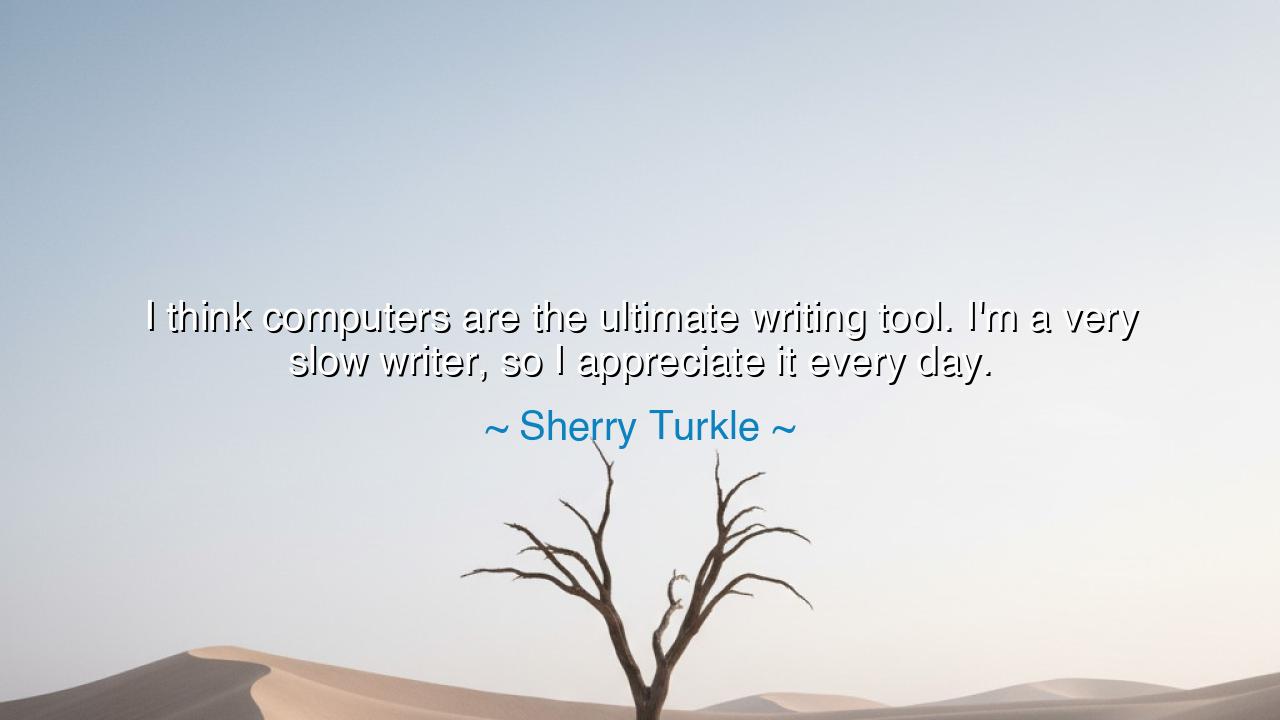
I think computers are the ultimate writing tool. I'm a very slow
I think computers are the ultimate writing tool. I'm a very slow writer, so I appreciate it every day.






“I think computers are the ultimate writing tool. I’m a very slow writer, so I appreciate it every day.” Thus spoke Sherry Turkle, the scholar of the human spirit in the digital age — a thinker who gazes not only into the glowing screen, but into the soul reflected upon it. In her humble confession lies a truth of great depth: that the computer, this creation of logic and wire, has become the companion of human thought, the instrument of expression through which the slow, deliberate rhythm of the mind finds its perfect echo. Her words are not merely about technology, but about the eternal dance between human creativity and the tools we forge to extend it.
In the ancient days, the scribe sat before parchment, dipping his quill into ink, each word a slow labor of patience and devotion. To write was to carve thought into being — an act both sacred and exhausting. Then came the press of Gutenberg, the typewriter, the machine that multiplied voices and quickened the pace of words. Yet, none of these inventions ever touched the soul of writing as profoundly as the computer. For it is not merely a tool of speed, but a vessel of revision, reflection, and rebirth. It allows the hesitant thinker, the cautious artist, the “slow writer”, to experiment without fear — to mold and remold their ideas until thought itself becomes music.
Turkle, a psychologist and philosopher, has spent her life studying the relationship between people and their machines. She knows that the computer is not just an object of convenience, but a mirror that reveals who we are when we create. In her words, we hear gratitude not for ease, but for empowerment. To be a slow writer is not a weakness — it is the mark of one who listens to the quiet murmurs of meaning before setting them free. The machine, then, becomes a partner — a patient listener that holds every draft, every deletion, every rediscovered phrase, waiting without judgment. It is the ultimate writing tool because it does not rush us, but rather gives us the courage to linger.
Consider the story of Leo Tolstoy, who wrote War and Peace by hand, rewriting it seven times before he was satisfied. His manuscripts were labyrinths of revisions — pages upon pages crossed out and rewritten, a testament to the agony and ecstasy of creation. How different his struggle might have been had he held within his hands a device that could move whole paragraphs in an instant, restore lost passages, and preserve infinite drafts. The computer, in Turkle’s sense, does not replace the discipline of writing — it liberates it. It frees the artist from the tyranny of permanence, allowing thought to evolve as swiftly or as slowly as the spirit demands.
Yet, Turkle’s wisdom carries a deeper echo. She is also the same voice who warns that technology, when unexamined, can distance us from ourselves. Thus, when she calls the computer the ultimate writing tool, she speaks not of blind dependence, but of mindful partnership. A tool, however powerful, is only as noble as the hand that wields it. The computer amplifies not just speed, but intention — it can deepen reflection or destroy it, depending on the soul behind the screen. To appreciate the tool, as Turkle does, is to use it with reverence — to let it serve creation, not replace contemplation.
In this, her statement becomes a quiet hymn to the balance between human thought and machine assistance. The ancient sculptor had his chisel, the poet his pen; now, the writer has the keyboard, the glowing page, the infinite scroll of digital parchment. But the heart remains the same. The act of writing — of giving form to the invisible — is still sacred. What has changed is the freedom with which we may now explore it. The computer, that cold creation of code, becomes warm in the hands of one who uses it not merely to produce, but to listen to their own voice more clearly.
So, O seeker of words and wisdom, learn from Sherry Turkle’s gratitude. Do not despise your slowness; cherish it. Let the machine be your ally, not your master. Write with patience, rewrite with joy, and allow your ideas to unfold as they will. The computer is the bridge between thought and expression — but it is the human soul that gives it purpose. Use it to refine, not to rush; to discover, not to display.
And when you next sit before that glowing screen, remember Turkle’s gentle truth: that the ultimate tool is not the machine itself, but the partnership between technology and the timeless art of thinking deeply. For the computer may hold infinite words, but only the writer can fill them with life, meaning, and heart.






AAdministratorAdministrator
Welcome, honored guests. Please leave a comment, we will respond soon